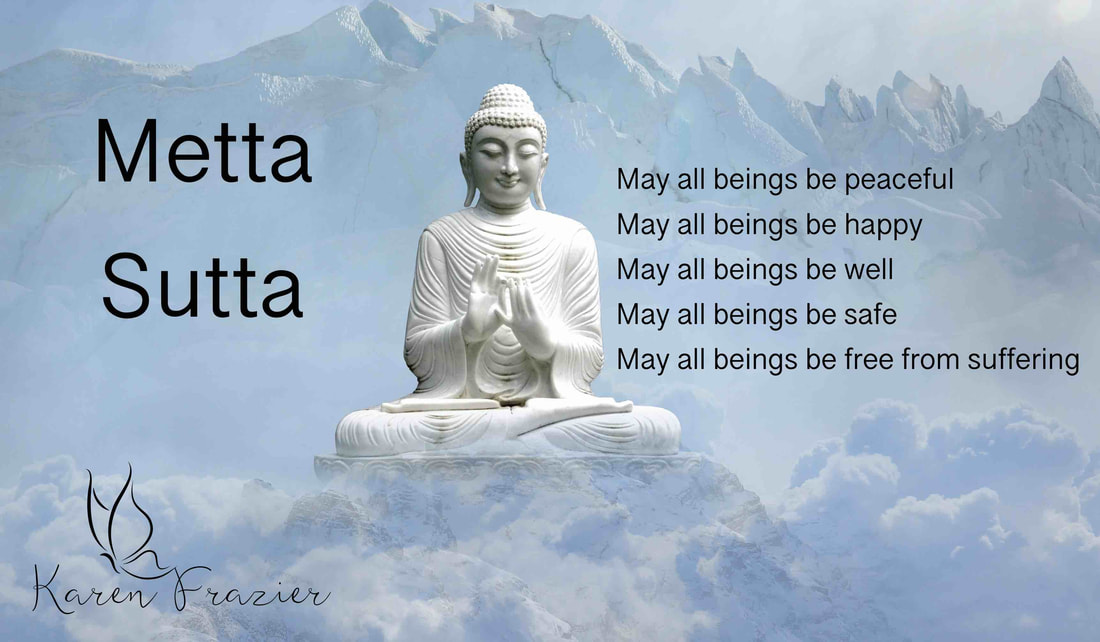The Brahmaviharas are four prized emotions or mindstates that give us a framework to cultivate positive behaviours and minimise harmful ones. They are called the “divine abodes” because they are the mental states in which all the enlightened ones reside. They are also known as the “four immeasurables” or “four limitless ones” because they represent love and goodwill towards all sentient beings, without limit.
The four Brahmaviharas are:
- Loving-kindness (Pali: mettā, Sanskrit: maitrī) is active good will towards all;
- Compassion (Pali and Sanskrit: karuṇa) results from metta, which is identifying the suffering of others as one's own.
- Sympathetic joy (Pali and Sanskrit: muditā) is the feeling of joy because others are happy, even if one did not contribute to it. It is a form of sympathetic joy.
May all beings have happiness and the cause of happiness.
May they be free of suffering and the cause of suffering.
May they never be disassociated from supreme happiness, which is without suffering.
May they remain in boundless equanimity, free from both attachment to close ones and rejection of others.
Because sentient beings are as limitless as space, our practice of these four virtues must also be immeasurable. We can begin developing these in our hearts by chanting aspirational prayers such as, “May all beings be happy, may the causes of their suffering be removed, may they always be joyful, and may they all remain in a state of equanimity.”
When you really love, you feel respect for the person or beings who are the object of your love. This attitude of loving kindness expands and increases by seeing and appreciating their good qualities. True love is based on pure perception and a respectful attitude towards yourself and others.
As I have indicated many times, all beings already enjoy some degree of love, compassion, joy, and equanimity. They are not qualities that we simply do not have or have never experienced. They are not beyond us in any way, like something we might discover in space. The Buddha and Shantideva both explain that these four are naturally inherent in our being.
When practiced impartially and consistently, love, compassion, equanimity, and joy lead to Buddhahood. Even when first beginning their cultivation, you will start to awaken to the inconceivable qualities of the Buddhamind. Everybody has the opportunity to grow in this way and realise Buddha-nature. This wondrous truth is the supreme potential we have to develop.
People often wonder why there are such great benefits associated with practicing Bodhichitta. To account for this, Buddha Shakyamuni gave four reasons.
First of all, when you grow in this way, you are not just doing it for one or two people. You are developing love and compassion for all beings, so there is great cause for an infinite expansion of merit. The practice truly brings joy and happiness to all sentient beings, directly or indirectly, so it is a great source of spiritual energy and miraculous abilities. This is the first reason given to account for the immeasurable power associated with the practice of Bodhichitta: the infinity of the objective focus—all sentient beings.
The second reason given is that, when considering the experience of all sentient beings, you feel from the bottom of your heart that you would like to remove their misery. Since you are not only thinking of the misery of one or two friends, but you are also aspiring to remove the suffering of all beings, the power of this virtue expands infinitely. This is the inconceivable power arising from the aspiration to relieve all of their suffering.
The third power is related to the fact that you would like to establish them in the unceasing happiness and joy of enlightenment. This is called the power of giving, the great aspiration to share happiness with all beings.
The fourth power is associated with tireless endurance. As we have already mentioned many times, the Bodhisattva’s endeavour is not just for one or two days. His or her commitment perseveres until every single sentient being is totally free from suffering and realises ultimate enlightenment.
This is what should be done by one who is skilled in goodness and who knows the path of peace:
Let them be able, upright, straightforward, and gentle in their speech.
Humble and not conceited, content and easily satisfied.
Unburdened with duties and frugal in their ways.
Peaceful and calm, wise and skilled, not proud and demanding in nature.
Let them not do the slightest thing that the wise will later reprove.
Wishing: In gladness and in safety, may all beings be at ease.
Whatever living beings there may be, whether they are weak or strong, omitting none,
The great or the mighty, medium, short, or small,
The seen and the unseen, those living near and far away, those born and to-be-born,
May all beings be at ease!
Let none deceive another, nor despise any being in any state.
Let none, through anger or ill-will, wish harm upon another.
Even as a mother protects with her life her child, her only child,
So with a boundless heart, should one cherish all living beings?
Radiating kindness over the entire world, spreading upwards to the skies,
And downwards to the depths; outwards and unbounded,
Freed from hatred and ill-will.
Whether standing or walking, seated or lying down, free from drowsiness,
One should sustain this recollection. This is said to be the sublime abiding.
By not holding to fixed views, the pure-hearted one, having clarity of vision,
Being freed from all sense desires is not born again into this world.







No comments:
Post a Comment
Note: Only a member of this blog may post a comment.